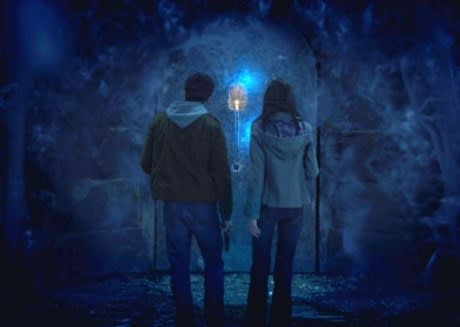In confronting annihilation anxiety and bigger questions of purpose and identity, the inevitable topic of fatalism (or determinism) versus free will arise, either reassuring the ego with greater purpose or exacerbating the central existential plight through knowledge of mortal frivolity. In broad terms, this theological debate is what drives the sub-genre of afterlife examinations like After, a lower budget variation on identity deconstructions like Stay or Open Your Eyes where people on the cusp of death revisit their lives in a piecemeal, dreamlike capacity.
Understanding the ubiquity of these genre tropes, first-time writer/director Ryan Smith doesn't mask the central conceit or exploit audience perspective to milk the element of surprise or force the obvious twist. We learn quite early that fellow bus passengers and neighbours, Freddy (Steven Strait) and Ana (Karolina Wydra), are somewhere between life and death, walking around their home town of Pearl by themselves as a black smoke cloud slowly encroaches on them from all directions.
Cleverly, their examination of respective identity is inexplicably intertwined, stemming from childhood guilt and regrets that ultimately make up their current ideologue, as shown through a series of flashbacks and afterlife presentations of memory. Any seeming plot holes about rationale in sharing a mutual perception of impending death is smartly wrapped up in the guiding fatalistic trajectory, which is interestingly contrary to the ever-present will of both characters, trying to have a say in their eventual fate.
The handling of consciousness through radio recordings and mystery solving is in itself quite compelling as methods of presenting communication between the inner-mind and outer-world, but where After stumbles is in dialogue and performances.
While the bigger questions are thought-out and mapped intricately, the superficial conversations between Ana and Freddy lack the nuance necessary to invest us in their plight. When they first meet, they ask each other the standard questions about job and geography but never demonstrate much beyond their archetypal character types—her as reluctant, snotty nurse and him as socially awkward comic book geek. Eventually, we learn more about their motivators and psychology, as per the template of the film, but it's never particularly deep or believable.
Still, as far as a first time work of such ambition goes, this theological exploration impresses through scope and ingenuity. With a little more attention to character details—and slightly better actors—Smith's follow-up could be something to anticipate.
(Seabourne Pictures)Understanding the ubiquity of these genre tropes, first-time writer/director Ryan Smith doesn't mask the central conceit or exploit audience perspective to milk the element of surprise or force the obvious twist. We learn quite early that fellow bus passengers and neighbours, Freddy (Steven Strait) and Ana (Karolina Wydra), are somewhere between life and death, walking around their home town of Pearl by themselves as a black smoke cloud slowly encroaches on them from all directions.
Cleverly, their examination of respective identity is inexplicably intertwined, stemming from childhood guilt and regrets that ultimately make up their current ideologue, as shown through a series of flashbacks and afterlife presentations of memory. Any seeming plot holes about rationale in sharing a mutual perception of impending death is smartly wrapped up in the guiding fatalistic trajectory, which is interestingly contrary to the ever-present will of both characters, trying to have a say in their eventual fate.
The handling of consciousness through radio recordings and mystery solving is in itself quite compelling as methods of presenting communication between the inner-mind and outer-world, but where After stumbles is in dialogue and performances.
While the bigger questions are thought-out and mapped intricately, the superficial conversations between Ana and Freddy lack the nuance necessary to invest us in their plight. When they first meet, they ask each other the standard questions about job and geography but never demonstrate much beyond their archetypal character types—her as reluctant, snotty nurse and him as socially awkward comic book geek. Eventually, we learn more about their motivators and psychology, as per the template of the film, but it's never particularly deep or believable.
Still, as far as a first time work of such ambition goes, this theological exploration impresses through scope and ingenuity. With a little more attention to character details—and slightly better actors—Smith's follow-up could be something to anticipate.
